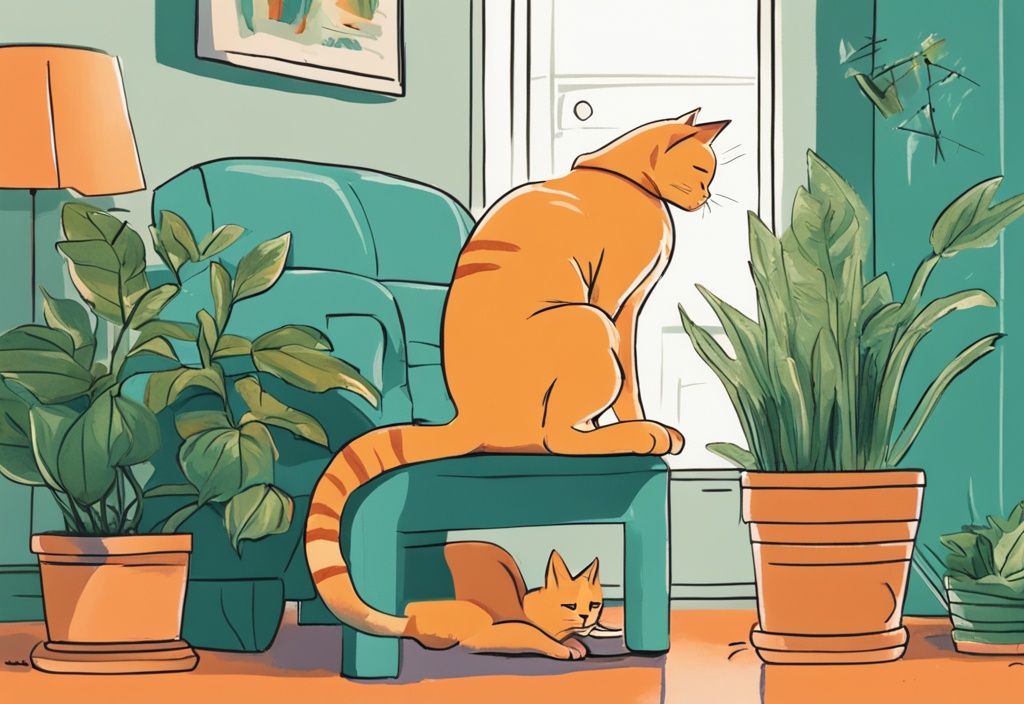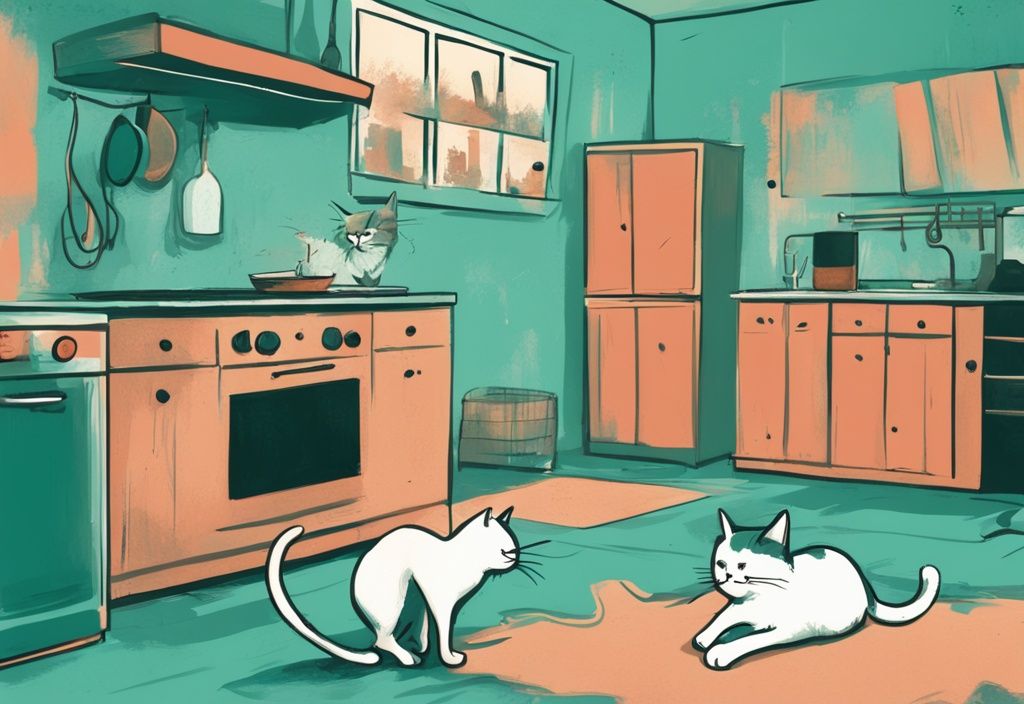As a passionate pet lover, I’m no stranger to those head-scratching moments we all share – like when Fluffy suddenly starts behaving in a way that leaves you furrowing your brows. The puzzled meow and pee blues, anyone? Indeed, a male cat peeing everywhere and meowing excessively can make even the most patient of us wrinkle our noses and scratch our heads. But hey, is Fluffy just being naughty, or is there a deeper issue?
Dive deep with me into this fluffy problem! We will explore the reasons behind these unusual behaviors – whether they are gulping yowls of distress due to health concerns, silent hisses of unease stemming from changes in his surroundings, or the spitfire hissy fits of feline stress knocking at your door. So, don’t worry! By the end, you’ll be a feline whisperer; understanding your pet’s secret language like it’s your second nature.
Believe me, once you decode the why, it puts you in a perfect spot to address the issue effectively, ensuring Mr. Mew’s fluffy tail is back to wagging happily in no time. Ready to embark on this enlightening journey to a purr-fectly content buddy? Let’s go then!
Identifying the Behavior: Excessive Meowing and Urination in Male Cats
Male cats can sometimes exhibit bewildering behaviors like peeing everywhere and excessive meowing, which may leave many pet owners scratching their heads, asking, “why is my male cat peeing everywhere and meowing so much?” These actions are not just random acts of mischief but are often signals of underlying issues. Here are some key points to consider:
Firstly, such behaviors could indicate **discomfort or unmet needs**. When a cat pees outside the litter box or meows excessively, it is trying to communicate. It might be feeling pain, which it cannot express in ways humans easily understand. Imagine your own discomfort and not being able to tell anyone! Several **behavioral disorders or medical problems** could be at play. For instance, a dog that has undergone FHO surgery might experience discomfort during recovery. From urinary tract infections to stress-induced issues, the reasons behind why your male cat is peeing everywhere and meowing so much can be diverse and complex. It’s crucial not to dismiss these behaviors as merely bothersome; they are often cries for help. When Whiskers, my cuddly rescue cat, had a similar issue, it turned out to be a simple (though stressful for both of us) UTI.
The environment can play a significant role. Changes around the home, such as new pets, different routines, or even a new litter box, can stress your cat. Stress can manifest in ways that might lead to excessive meowing and inappropriate urination. Think about how you feel when everything at home changes overnight—it’s overwhelming!
Understanding these behaviors requires a careful review of both medical and environmental factors. Consulting a veterinarian should be the first step in addressing these issues. They can conduct a thorough examination to rule out any potential medical conditions such as infections, kidney disease, or hyperthyroidism, all of which can cause discomfort leading to frequent urination and increased vocalization. For Whiskers, a vet visit was a game-changer.
In essence, when pondering “why is my male cat peeing everywhere and meowing so much,” it’s essential to consider a broad spectrum of potential causes. From medical issues to environmental stressors, understanding and addressing these factors can help rectify the problem and improve your cat’s overall well-being.
Medical Causes Linked to Your Cat’s Unusual Behavior
Understanding why your male cat is peeing everywhere and meowing so much can be a bit of a puzzle. However, diving into some common medical reasons can offer clarity and help you take the right steps for your furry friend’s well-being.
Invalid YouTube video ID
Could It Be Urinary Tract Infection?
Urinary Tract Infections (UTIs) are a common culprit behind why your male cat might be peeing everywhere and meowing excessively, as only 1-3% of cats with signs of urinary tract disease will have a urinary tract infection, making it essential to distinguish UTIs from other conditions such as crystals in the urine. For more information, check out this resource on UTIs in cats. Think of it like an annoying itch that just won’t go away. A UTI can lead your cat to urinate frequently but only in small amounts, often with an added dose of discomfort, sparking those meows. Notice any blood in the urine? That’s a telltale sign. Watch out for behaviors like straining to urinate, frequent but unproductive trips to the litter box, and excessive licking of the genital area. Spotting any of these? A quick trip to the vet for a urinalysis is a must.
Feline Lower Urinary Tract Diseases: What to Know
Feline Lower Urinary Tract Disease (FLUTD) is a broad term covering a range of urinary issues that might explain why your male cat is peeing everywhere and meowing excessively. Symptoms to watch for include difficulty urinating, blood in the urine, frequent but unproductive urination attempts, and excessive licking around the urinary opening, all contributing to discomfort and those endless meows. FLUTD can be triggered by stress, diet, or even your cat’s environment. Don’t wait—immediate veterinary care is crucial, as an untreated FLUTD can escalate into serious complications. Diet adjustments might also be part of managing this condition effectively.
Kidney Disease in Male Cats
Kidney disease, especially common in older male cats, might be the reason your cat is peeing everywhere and meowing so much. Symptoms include increased thirst and urination, weight loss, and vomiting—all adding up to a lot of discomfort. Chronic kidney disease results in the buildup of toxins in the blood, making your cat feel pretty lousy. Early diagnosis and management through diet and medication can drastically improve the quality of life for a cat dealing with kidney disease. Keep an eye out for these symptoms because tackling kidney disease early can make a world of difference.
Hyperthyroidism: Could This Be Causing The Problem?
Hyperthyroidism in cats manifests as an overactive thyroid gland, leading to noticeable behavioral changes. If your cat’s losing weight, drinking more water than usual, peeing frequently, and vomiting, hyperthyroidism could be the issue. These behaviors can disrupt your cat’s routines, leading to excessive urination and vocalization as they try to cope with the discomfort. Hyperthyroidism messes with a cat’s metabolism and behavior, making a vet’s diagnosis and treatment—typically involving medication or diet changes—absolutely essential.

What Are Crystalluria and Bladder Stones?
Crystalluria and bladder stones could explain why your male cat is peeing everywhere and meowing excessively. These tiny crystals and stones cause severe inflammation and pain, leading to frequent urination and vocal distress. In severe cases, these crystals can block the urinary tract, making it incredibly painful for your cat to urinate. Suspect crystalluria or bladder stones? Veterinary attention is crucial since surgical intervention might be necessary for severe cases. Additionally, dietary changes can help manage and prevent the recurrence of these conditions.
Is It Arthritis?
Arthritis or degenerative joint disease might be the sneaky reason behind your male cat’s unusual behavior. This condition makes it painful for older cats to climb, jump, or even squat, often leading them to avoid high-sided litter boxes. Consequently, they might start peeing elsewhere and meowing more due to the constant pain. If you notice such behavior, consult a vet who can recommend treatments like pain management and environmental modifications to make your cat’s life more comfortable.
Understanding Feline Idiopathic Cystitis (FIC)
Feline Idiopathic Cystitis (FIC) is a stress-related condition that could explain why your male cat is peeing everywhere and meowing so much. FIC often results in frequent urination in small amounts, sometimes accompanied by blood and loud meows due to discomfort. Unlike other urinary issues, FIC has no clear cause but is strongly linked to stress and anxiety. Managing FIC involves reducing stressors in your cat’s environment, ensuring a stable and comforting routine, and possibly using medications or dietary changes as advised by your vet.
Common Behavioral Reasons behind Your Cat’s Meowing and Peeing
Cat Spraying vs. Excessive Urination
Cat spraying and excessive urination are quite the conundrum for most pet owners! Think of spraying as your cat’s way of sending postcards to other felines. This behavior often involves your kitty depositing small amounts of urine on vertical surfaces like walls or furniture. It’s more common in unneutered male cats but can also surprise you in females and neutered males. The key difference between urination and spraying lies in the cat’s posture. Cats urinate by squatting on horizontal surfaces, while they stand with their tail up to spray on vertical surfaces.
Understanding these differences provides insights into why your male cat is peeing everywhere and meowing so much. Spraying is often a way to mark territory or express stress, whereas excessive urination might be waving a medical red flag.
Changes in the Litter Box That Affect Your Cat’s Behavior
Cats, with their endearing quirks, can be ultra-picky about their litter box setup. Such finickiness means even tiny changes can lead to a mutiny. Moving the litter box, switching up the type of litter, or just skimping on cleaning can trigger stress, leading your cat to boycott the box altogether.
A sparkling clean litter box in a quiet, convenient location is key to encouraging proper use. Any changes to the litter box? Make them gradually so your cat adjusts comfortably. Maintaining a welcoming and consistent litter box environment can work wonders in stopping unwanted behaviors like your male cat peeing everywhere and meowing so much.
Recognizing Territorial & Stress-Related Influences
Territorial instincts and stress are like the dynamic duo behind your cat’s urination and vocalization problems. Major life changes like moving to a new home, new pets, or even shifting household dynamics can prompt your cat to go into overdrive with meowing and marking territory with pee.

Cats often spray urine to seek comfort, manage their stress, or signal their presence to other cats in the ‘hood. Poor socialization can make them even more prone to spraying out of insecurity. Tackling why your male cat is peeing everywhere and meowing so much involves minimizing his exposure to stray animals (ever tried closing blinds?) and using pheromone sprays to create a zen-like atmosphere. Establish a stable routine and ease those stressors to help your cat feel secure and content.
What To Do When Your Male Cat Pees Everywhere and Meows Excessively
Cats are lovely creatures, but sometimes, your male furball might start exhibiting behavior that’s less than adorable. If you’re asking yourself, “why is my male cat peeing everywhere and meowing so much,” you’re not alone. Let’s dive into some playful yet comprehensive strategies to address this issue and bring peace back to your home.
Begin With a Detailed Vet Checkup
If you’re wondering “why is my male cat peeing everywhere and meowing so much,” the first step is to schedule a comprehensive vet checkup. Early detection and treatment are crucial for addressing potential medical issues such as urinary tract infections, kidney disease, or hyperthyroidism. Immediate veterinary consultation is advised for sudden or persistent changes in behavior, as they could indicate serious health problems that can significantly affect your cat’s well-being. A thorough vet checkup can help pinpoint the cause and provide appropriate treatment options.
Remember, tackling this issue early can save you and your feline friend a lot of stress and discomfort!
Improve the Litter Box Environment
Enhancing your cat’s litter box environment can also address why your male cat is peeing everywhere and meowing so much. Ensure the litter box is clean and situated in a quiet, accessible area. For older cats or those with physical limitations, consider using low-sided litter boxes for easier access.
In multi-cat households, it’s essential to provide an adequate number of litter boxes to reduce stress and prevent territorial conflicts. Maintaining a clean and inviting litter box environment can encourage proper usage and alleviate inappropriate elimination issues. Just imagine how much nicer it is to use a sparkling clean bathroom!
Providing Calmness and Stress Management for Cats
Stress management is vital when addressing why your male cat is peeing everywhere and meowing excessively. Provide calming aids such as pheromone diffusers, ample play, and exercise to keep your cat physically and mentally stimulated. Creating a safe personal space around the litter box can also make your cat feel more secure.
Consider offering extra attention, interactive play sessions, and possibly duplicate favorite toys. Preventing your cat from seeing outdoor animals by closing blinds and making previously marked areas positive by using them for play or feeding can help as well. Under veterinary advice, consider using medications to manage severe anxiety.
It’s a bit like us unwinding with a good book or a favorite hobby—calm and happiness go hand in paw!
Is Neutering Your Male Cat The Solution?
Neutering your male cat can be an effective solution to curb inappropriate urination behaviors, especially if territorial marking is the issue. Unneutered male cats often spray to mark their territory, which can manifest as peeing everywhere.
Early neutering can prevent the development of such spraying behavior, providing a long-term solution to why your male cat is peeing everywhere and meowing so much. Consult with your veterinarian about the best time for neutering to address and prevent these behaviors effectively. Think of it as helping your feline friend focus more on fun and cuddles and less on managing territory wars.
Escalate The Issue: When and Why To Consider Medication and Special Diets
Sometimes figuring out why your male cat is peeing everywhere and meowing so much means diving into more complex issues that might call for advanced interventions. When simple fixes like moving the litter box or tweaking the home environment don’t work, it might be time to think about medication and special diets.
Considering Medication
Have you ever chatted with your vet about anti-anxiety meds for your kitty? Because if stress is the main culprit behind your cat’s excessive peeing and meowing, those meds could be a lifesaver. Imagine how you feel under stress—now picture your cat feeling that way, but with no way to tell you! Anti-anxiety medication can help soothe your cat’s nerves and reduce these frustrating behaviors. Always make sure to follow your vet’s advice to ensure the medication is right and safe for your feline friend.
Offering Special Diets
You know how a good meal can make your day? Well, the same goes for your cat, especially if they’re dealing with urinary or stress-related issues. Special diets designed by vets can include calming ingredients or components that promote a healthy urinary tract. These meals not only help with stress but can also prevent painful bladder stones or crystals, which often lead to frequent urination. Giving your cat the right diet means tackling the problem from the inside out.
The Importance of Proper Nutrition
Poor nutrition often plays a starring role in why your male cat is peeing everywhere and meowing so much. Feeding your cat a balanced and species-appropriate diet is essential for their urinary health and overall well-being. Just think of how different you feel when you eat well versus when you don’t! Prioritize high-quality foods that cover all nutritional bases, supporting a healthy urinary tract and mitigating the behavioral hiccups that sprout from nutritional gaps.

When it comes to why your male cat is peeing everywhere and meowing so much, advanced solutions like medication and special diets become essential if the usual tricks fall flat. With professional guidance, the right meds, and tailored diets, you can support your cat’s health and comfort, making your home a happier place for both of you.
FAQ about Excessive Meowing and Urination in Cats
Why is my male cat meowing so much?
– Ever wondered why your male cat is serenading you with non-stop meows? It’s often a sign that he’s trying to tell you something. Maybe he’s feeling stressed, experiencing discomfort from a medical issue, or he has an unfulfilled need like hunger or a desperate craving for some snuggle time. Consulting a vet is super crucial to rule out any health problems and to cater to your cat’s needs. Remember, a happy kitty equals fewer meows!
How can I know if my cat has a urinary tract infection?
– Spotting a UTI in cats can feel like solving a mystery, but here are some clues: straining to pee, frequent and small urination, blood in the urine, and excessive licking of the genital area. Think your feline friend might be affected? A quick vet visit for a urinalysis can give you the answers you need.
What’s the difference between cat spraying and normal urination?
– Trying to decode your cat’s bathroom antics? Here’s a quick guide: Regular urination means your kitty will squat on flat surfaces. Spraying, on the other hand, involves your cat standing with his tail up and marking vertical surfaces, often with smaller amounts of urine. It’s like your cat’s graffiti art but smellier!
Can stress cause my cat to pee everywhere?
– Oh, the havoc stress can cause! Yes, it can absolutely lead your cat to pee all over the place. Stressors can range from changes in the household and new pets to a lack of socialization. The good news? Addressing these stressors can help bring an end to your cat’s messy habits.
Conclusion
When your male cat is peeing everywhere and meowing so much, tackling the root causes is vital not just for your kitty’s health, but also for your sanity. Remember, trying to punish a cat typically backfires, making matters worse. Instead, give positive reinforcement a go and dig deep into what’s really going on.
Identify and Address Underlying Issues
So, why is my male cat peeing everywhere and meowing so much? These pesky behaviors often pop up due to medical problems or unmet needs. Make it a point to partner with your veterinarian to uncover any potential health issues. Regular checkups are a lifesaver for catching things like urinary tract infections, kidney diseases, or hyperthyroidism before they spiral out of control.
Veterinary Consultation
A thorough vet examination is essential. Sudden or persistent behavioral changes can be red flags for serious health problems that need your immediate attention. Your vet is your best ally here, offering specific treatments or dietary tweaks tailored to your cat’s unique needs.
Positive Reinforcement Over Punishment
Never, ever punish your cat for skipping the litter box. Such actions can crank up the stress and make the behavior worse. Instead, use positive reinforcement techniques. Shower your cat with praise or treats for using the litter box correctly, and make sure that the litter box is always inviting and spotless.
Create a Supportive Environment
A comfy, stress-free environment works wonders for easing behavioral issues. Ensure your cat has a quiet, clean, and easily accessible litter box. Manage stress by offering plenty of playtime and create safe spots for your cat to retreat. Pheromone diffusers or anti-anxiety meds (on your vet’s advice) can also be game-changers.
Addressing why is my male cat peeing everywhere and meowing so much requires you to take a holistic approach. Focus on health, environment, and positive reinforcement. Create a loving, stress-free home, and you’ll see an improvement in your feline friend’s well-being.
